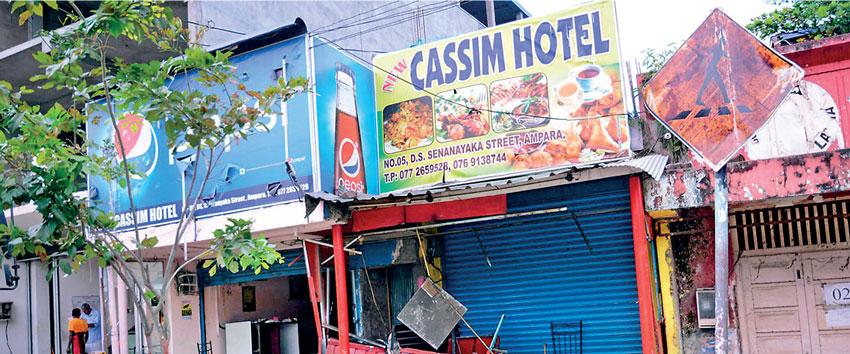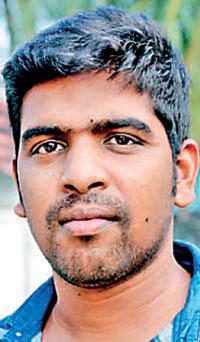
New Cassim Hotel
By
D.B.S.Jeyaraj
Five years have passed since anti-Muslim violence erupted in the Amparai/Ampara Town in February 2018. Soon afterwards, in the first week of March, there was anti-Muslim violence in Digana. Thereafter it spread to other areas in Kandy District like Teldeniya, Pallekalle, Katugastota, and Akurana.
The damage in Amparai/Ampara was very much less compared to the destruction in Kandy. Although the quantitative nature of the anti-Muslim violence was greater in the Kandy District, the Amparai/Ampara violence was in a sense more dangerous qualitatively due to the reason cited as the cause for the attacks.
It was alleged in Amparai/Ampara that a Muslim-run eatery was mixing contraceptives and sterilising drugs in the food served to Sinhala customers.
The accusation was absurd as scientifically or medically it was not possible to prevent “babies forming in wombs” through administering contraceptive drugs in food, particularly in kothu roti or meat curry.
It is not possible to weaken sperm by mixing drugs in food as any drug would lose potency when being heated to a high degree on a stove or cooker. Yet, this is what was alleged and propagated to trigger off and later justify the Amparai/Ampara violence.
I have written in detail about the anti-Muslim violence in Ampara town and Kandy District when it happened in February and March 2018.
I was however requested last week by a Human Rights Organization to compile a report on what had happened five years ago. As such I revisited those tragic events and am now focusing on the anti-Muslim violence in Amparai/Ampara in this article.
Ampara/Amparai

Ahmed Bharshith |
Ampara/Amparai is an Eastern Province town situated 360 km from Colombo. It is spelt in Sinhala as Ampara and in Tamil as Amparai. Both spellings are used interchangeably by people as the pronunciation is almost identical.
Ampara/Amparai town is predominantly Sinhala with a sprinkling of Muslim and Tamil people. According to figures from the Ampara Mosque, only 104 Muslim families were registered in 2018 with the Mosque as permanent residents of the town.
The Tamil population is even smaller though a Tamil school still exists.
New Cassim Hotel
The New Cassim Hotel is a Muslim-owned and Muslim-run eatery on D.S. Senanayake Street in Ampara town.
The hotel, reputed for its egg roti, kottu roti and parotta (barotta), is patronised mostly by Sinhala customers, who relish the dishes cooked there.
Monday, February 26, 2018, was a very busy day for the hotel. Most of the food cooked on that day was consumed by a large number of customers. It was 9:40 p.m. when three Sinhala youths walked in. One of them was a known Ampara resident and a regular customer of the hotel. He worked at the National Water Supply and Drainage Board and was generally known as “Water Board Ranga”.
Water Board Ranga
The trio was in a state of intoxication. They wanted kottu roti and beef curry. The Manager cum Cashier Ahamed Lebbe Bharshith told the youths that food supplies were over and that they were about to wind up for the day.
Water Board Ranga had then said he was a diabetic and had taken an insulin injection. Therefore he needed to eat soon and wanted beef curry.
Since Ranga was a regular customer and pleaded for food on the grounds of being a diabetic who had injected insulin, Bharshith took pity on him. He called the elderly cook who was called Kaaka (elder brother) by the staff and asked him what could be done.
The hotel staff numbering six had stored some parottas and beef curry for their own dinner. Kaaka suggested that they could share it with the Sinhala customers.
So, the parottas and beef curry were brought and the customers including the ‘diabetic’ tucked in.
As the beef curry diminished, a few puffy particles were found floating in the gravy. Water Board Ranga blew a fuse and called the cashier and demanded to know what it was.
What happens in eateries of this sort is that they mix flour with the gravy in a meat curry to thicken the liquid if it was too watery.
Usually, the flour is mixed well and dissolves without a trace in the gravy. But sometimes it does not dissolve properly and thick clumps remain.
This was what had happened in this instance. So, Ranga was told it was paan piti, (bread flour or wheat flour). But he refused to believe it.
Water Board Ranga then began making a few calls on his mobile phone. Thereafter events took a dangerous turn. He started accusing the hotel cashier and staff of mixing Wanda Pethi (Contraceptive drugs or sterilising capsules) with the beef curry to prevent Sinhalese from having children.
Wanda Pethi dammadha?
He began asking, Wanda Pethi dammadha? (Did you mix contraceptive drugs?) It was denied vehemently by the cashier, cooks and waiters.
When they said no, they were slapped hard. Two more Sinhala youths arrived with iron rods. Now the mood turned more belligerent.
A waiter was once again asked whether they put Wanda Pethi into the beef curry. When he said ‘no’, he too was assaulted with the rods and sustained head injuries.
The Cashier cum Manager Bharshith was approached again and asked, Wanda Pethi dammadha?
At the same time, the scene was being recorded by the camera in the telephone. Intimidated and perturbed, the youthful Muslim cashier got confused.
He said, Yes.
Bharshith was to explain later that he had not understood what Wanda Pethi meant.
He had confused maa meaning flour in the Tamil language with the maa sound in Dammadha.
So he said ‘yes’ to the repeated question of whether Wanda Pethi had been put in the curry.
This was seized upon by Water Board Ranga and his accomplices. The ‘cashier confession’ about mixing Wanda Pethi in food was uploaded and began spreading like wildfire via the internet.
By this time a large crowd had gathered. The Police who had been called earlier arrived at 10. 15 p.m.
The cops were shown the telephone confession. The Policemen also viewed the CCTV cameras and knew what had happened.
After a huge commotion, the Policemen seized the alleged Wanda Pethi as evidence and took away the cashier and cook to be questioned further about allegedly mixing sterilising drugs with food served in the hotel.
They were told that they were being locked up in the Police Station for their personal security.
Water Board Ranga went to the Police Station and lodged a formal complaint that the Cassim Hotel was serving Wanda Pethi in the beef curry to Sinhala customers.
Meanwhile, a large number of Sinhala youths arrived at the hotel in a mini-bus and on motorcycles and scooters. Soon a mob of over 60 persons gathered at the spot. The mob then started attacking New Cassim Hotel and damaged it.
They seized the CCTV cameras in the hotel and the vicinity and took them away. Two Policemen supposedly on duty at the Cassim Hotel premises saw all that was happening but did not do anything to restrain the mob.
Diga Kalliya
The worst was yet to come. At about 11 p.m. more than 100 Sinhala youths arrived in the Amparai town in jeeps, vans and motorcycles.
These youths joined forces with the earlier batch that had targeted the Cassim Hotel. Now there were over 200 men at the spot. Interestingly the youths identified themselves as belonging to the Diga Kalliya (Group from Diga).
Diga is derived from Digamadulla the historical name of Ampara and the official name of the Electoral District. It is suspected that the Diga Kalliya was an Ampara-based affiliate of the Bodu Bala Sena (BBS) and consisted of youths from different political parties.
Jumma Masjid Mosque
The mob then went on the rampage.
The mob attacked another Muslim hotel Rahmaniya and a Muslim-owned grocery store named New Mahajana Stores.
The people inside both premises took refuge in the homes of their Sinhala neighbours. The mob stoned a few Muslim houses where the inmates had fled and also attacked another small eating house owned by Muslims.
The Diga Kalliya then marched towards the Jumma Masjid Ampara Mosque. A Defender Jeep was driven fast to smash the gate and break it open. The mob then moved in after assaulting the watcher.
Initially, the wall in front of the Mosque was demolished. It was rather a bizarre act. There was a suspected motive in this act of perceived madness.
The 2018 February Local Authority elections had seen the Pohottuwa Party (SLPP) romping home as the winners in the Ampara Urban Council poll. When the Sri Lanka Podu Jana Party pasted Victory and Thank you posters all over Ampara town, some were affixed to the Mosque wall too. The Mosque authorities had torn down all the lotus bud posters saying they were defacing the wall.
A heated argument had ensued between the SLPP supporters and Mosque authorities.
It was suspected therefore that the demolition of the Mosque premises wall was motivated by the poster incident.
The mob however did not stop after destroying the wall. They damaged eight vehicles parked inside the Mosque precincts. Recently-planted mango tree saplings were uprooted and destroyed. The Mosque itself was attacked. Doors were broken down and windows smashed, and copies of the Holy Quran were defiled and burnt.
The Mosque office adjoining the main Mosque was also attacked and damaged.
There were also small structures with rooms within the Mosque precincts where people connected to the Mosque were staying. Those structures were also damaged and people were assaulted. The Muadhin, who conducts or leads prayers was also beaten.
Police Passive Onlookers
The Police station in Amparai was less than a kilometre away from the Mosque. The cops had been informed of the attack as soon as the mob arrived on the scene.
Besides the Police already knew of violence in the town and some cops were even passive onlookers while the attacks continued.
The mob lingered in town for several hours but the Police made no effort to tackle the violent elements.
Some cops were seen conversing with the mobsters in a jovial manner. It was as if a heroic war had been waged and a deadly enemy had been vanquished.
It would have taken the Police only three minutes to reach the Mosque from the station if they wanted to stop the attack on the Mosque. Yet, they went to the Mosque premises leisurely only 55 minutes after they had been informed by people at the Mosque.
When the Amparai/Ampara incidents occurred the Kandy District violence had not begun. Hence, Ampara/Ampara became the focus of attention.
It was wrongly reported that Sinhalese and Muslims were clashing whereas the reality was a mob attack without any resistance.
Moreover, it was propagated that the violence was due to allegations of contraceptive drugs being served to Sinhala customers in Muslim restaurants. This again was utterly false.
Particles of Flour
The Government Analyst Ariyananda Welianga subsequently nailed that canard conclusively.
After examining the ‘stuff’ suspected of being Wanda Pethi, the Government Analyst ruled that the alleged contraceptive drugs were merely particles of flour scientifically described as carbohydrates.
Later the resident representative of the World Health Organization (WHO) and a group of eminent Sri Lankan medical professionals also went public on the issue.
They stated unequivocally that drugs or pills rendering people temporarily infertile did not exist.
Premeditated Violence
There is a qualitative difference between suddenly provoked spontaneous violence and deliberately executed premeditated violence.
This is what happened in Amparai/Ampara. The Wanda Pethi false alarm was only the flashpoint which triggered off the violence that was waiting to happen.
The flour clumps in beef curry at New Cassim Hotel provided the raison d’etre for unleashing pre-planned anti-Muslim violence in the town of Ampara/Amparai.
D.B.S.Jeyaraj can be reached at dbsjeyaraj@yahoo.com

